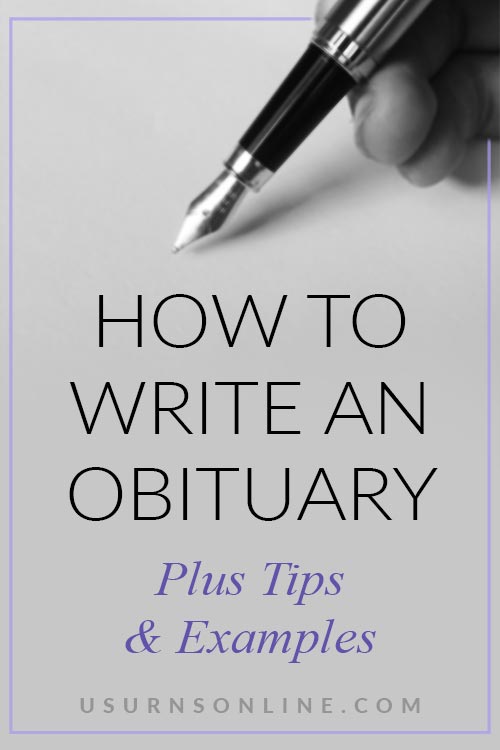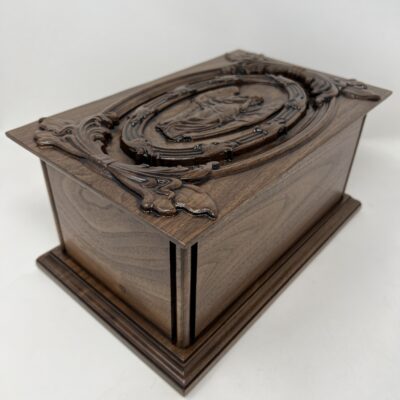Here are some obituary examples and tips on what to write as you try to sum up your loved one’s beautiful life in words.
I’m both a professional writer and a funeral director. I’ve seen all types of obituaries, and can give you helpful guidance on writing an obituary, what to include, and how to hit the right tone.
Here’s how.
What Is an Obituary?
An obituary is a person’s life story, in brief, designed for publication. It should be told with love, kindness, and even humor.
Specifically, an obituary does three things:
- Tells the story of your loved one’s life
- Notifies the public of their death
- Provides the funeral and memorial information
You should put a lot of thought and care into writing an obituary. It will certainly be read, both at the time of publication and long afterwards. Many people do genealogy by going over obituaries and researching their family history, so it will be read often throughout the years.
As you write, you will be summing up your loved one’s life in a couple of hundred words or less and including important information along the way.
Please read on and get some great information on writing the perfect obituary. Whether you want to keep it short or make it all-inclusive, we’ve got some great tips and obituary samples for you below.
What should you include in an obituary?
- The full name of the deceased, including:
- A woman’s maiden name
- Any nicknames your loved one is known by
- Middle names and suffixes (Jr., III, etc)
- Age at time of death
- Birthdate and death date
- State and town of birth and death
- Immediate surviving family members
- Brief biography
- Funeral information
- Donation information
- State and town of birth and death
- A picture of the deceased
Related: How to Set Up & Accept Funeral Donations (for Free)
What should you not include in an obituary?
- The deceased’s physical address
- Ex-spouse(s), though there may be exceptions to this: if they are still “friends & co-parents,” etc
- Cause of death (this is a personal decision, left up to the family)
- Any negative feelings you may have towards the decedent
- Anything that may encourage identity theft
- Don’t list anything that is too private
How to Write an Obituary, Step by Step
You’ve been asked to write the obituary or help contribute. Here are the steps to write an excellent obituary, along with what to include and some great tips as well.
Urns Made in the USA
1. Start with their name and describe the decedent in a few words
List their full name and any nicknames.
- Jeffery Robert Hale, husband, father, grandfather, auto mechanic, and enthusiastic bird watcher…
- Mary Irene (Jacobs) Smith, head nurse at Community Hospital…
- James (Skipper) Sutton, father, and avid boater…
2. Announce the death
Include the date and their age at the time of death.
- Robert “Bobby” Dunn died peacefully at his home in May, 2020, at the age of 52.
- Lydia (Wells) Peterson went home to her Lord and Savior on July 15, 2021, at the age of 97.
- Janette Whims passed at the age of 67. Her husband and three children surrounded her.
It is okay for the family to share the cause of death if they want to.
- After a long battle with cancer, Jason R. Smith died peacefully. His loving family surrounded him.
If someone has completed suicide, the family may want to talk about mental health in the obituary. This can be a very touchy subject for some people. It is painful to realize that someone was hurting so much that they would take their own life to end the pain. You might consider discussing it briefly to help the loved ones of future victims. Suicide is an issue that is more widespread than most people might think.
3. Write a brief biographical sketch
- Begin with general facts
- Include important dates (graduation, marriage, etc)
- Early life information, followed by mid- and later-life
- Information about their community
- Include hobbies
4. Include key highlights and accomplishments
- The first one in the family to go to college
- Promoted to Vice President of their company
- Awarded the Medal of Honor
- Community volunteer
Mention things that the deceased was proud of accomplishing.
5. Briefly touch on what they loved in life
- Loved spending time with their grandkids
- Had a beautiful garden
- Lifelong Minnesota Vikings fan
- Enjoyed yardwork, model building, or baking
There are so many things in life that we take pleasure in. Share your loved one’s joys with the world.
6. Mention family members
- Karen was the daughter of Sandra nee Langton and Glenn Lembke.
- Barbara is survived by her children Sarah and Cody.
- Joseph has one surviving brother, Luis.
You can even mention your loved one’s beloved fur babies.
7. Add funeral information
- Visitation will be held at Maquett’s Funeral Home on Monday, April 17, at 10:00 am, and is open to the public. The funeral service will follow immediately at 11:00 am.
- A memorial service will be held at a later date.
- Join us for a celebration of life at Genevive’s Banquet Hall on Sunday, July 29. The celebration will start at 1:00. We will be serving finger foods and soft drinks. Genevive’s is located at 1234 Hall St., Lake Renwick, MI.
8. Flowers
It is traditional for the immediate next of kin to supply the casket spray. Close relatives will purchase the easel pieces that will be placed at the head and foot of the casket. Other mourners can bring flowers as they see fit.
If you would like to specify a particular type or color, or if your loved one had a favorite type, then do so in the obituary as part of the funeral details.
- Daisies were Leslie’s favorite flower; guests are welcome to bring daisies of all colors.
- Roses will be provided at the committal to place on the casket.
- Flowers may be sent to Gresham Funeral Home at 116 Main St.
- White flowers only, please.
When deciding on flowers, keep in mind the deceased’s favorite color. You might even want to learn the meanings behind certain flowers before sending anything.
9. In lieu of flowers/donations
Some families may not want any flowers sent for the service. Everyone should honor their request of no flowers.
If the family asks for donations, it is appropriate to donate the amount that you would have put towards any flower arrangement (typically in the range of $50-100).
- In lieu of flowers, we ask you to make a donation to the American Cancer Society in David’s name.
Read more: In Lieu of Flowers: What to Ask For (and How to Say It)
10. Include photos
Including a photo with an obituary is always nice. But it is good to remember that the newspaper is going to charge an extra fee for any photograph.
Sometimes people include a recent photo, while others place an older picture. The choice is yours. You can use the same photo as you do on the funeral program, or a different picture (one recent, the other from years ago).
Obituary Writing Tips
Ask for stories and information. Gather as much information as you can before you start writing the obituary. People always want to help when it comes to an obituary, so don’t be shy to ask friends or family questions.
Focus on the positive, and avoid the negative. When you ask the family for information, it will help bring up memories: some good and maybe some that aren’t so good. Keep an obituary complimentary and positive. An obituary is not a time for you to air dirty laundry.
Organize your material. Follow the obituary writing steps above to organize your material. If you have the information you need, you should be able to write half or more of the obituary in just a few minutes. You’ll also have several stories to help shape the central biographical part. You’ll be well on your way.
If you’re having trouble phrasing, speak it. Writing can be difficult, especially if you’re not used to it. One simple way to improve your writing is to say it out loud. Explain what you want to say to a friend – then write what you just said! Or say it out loud and record it with your phone, then go back and write out your words. You talk every day, so that comes more naturally. Take advantage of your well-practiced ability to speak.
Limit adjectives. Avoid flowery language by eliminating adjectives. (An adjective is the word before a noun, which describes or modifies the noun.) It is easy to overuse adjectives, and then your writing will become cluttered. Instead of “She was a passionate, devoted gardener,” simply write, “She loved to garden.”
Use short sentences. Avoid rambling and run-on sentences by keeping each sentence brief and to the point.
Read it out loud. Once you’re done, consider it your first draft and then speak it out loud. You’ll notice any odd phrasing, repetitive information, or perhaps things you’ve left out. Revise, then read it to someone who will give fair, honest feedback. Incorporate their advice as you see fit, and then you should have a well-written obituary.
Obituary Examples
Write the perfect tribute to your loved one by reading examples from other obituaries.
Obituary Example for Mother
We just lost our beloved mother, Kimberly Ann (Baker) Smith, on July 2, 2021. Kim fought cancer, but it never stopped her from living her best life. Kim died in her home surrounded by her family: her husband Jeff and her daughters Annie and Paula.
Kimberly was born in Minot, ND, on December 31, 1964. Kimberly says she learned everything she knew from her parents, Patrick and Paulina Baker.
Obituary Example for Father
On Monday, October 17th, 2020, Joseph Michael Johanson passed away in a tragic car accident at the age of 52. The world has lost a great husband and father.
Joe always wanted to be a father. In the year of 1988, Joe’s dreams came true with the birth of his son Michael Joseph.
Joseph went on to develop his own software and create his company Software and More. His son Michael will now take the helm of the family business.
Joe’s memorial service will be held on Saturday, October 29, at 2 p.m. at the Lawn Funeral Home. Reception to follow at Reggie’s Pizza Joint.
Obituary Example for Sister
Our sister, Mary Beth Long, passed away on Sunday evening, November 10, 2020. She was surrounded by her three brothers, Todd, Jerry, and Paul. We three will miss her more than words can say.
Mary Beth leaves behind a legacy of love and laughter that no one could match. She brought joy no matter where she went.
Mary Beth’s funeral will be held at the Main Lutheran Church in Van Lake, WI, Wednesday, November 13 at 10:00 am. Burial to follow at the Lutheran Cemetery in Van Lake. Follow in the procession.
Obituary Example for Brother
“Frank” Francis Jackson, 89, of Philadelphia, PA, died February 7, 2021, at his home. Mr. Jackson was born July 1, 1932, in Pembina, ND, to Robert and Emma (Hone) Jackson.
Frank attended Raleigh High School in Pittsburg, PA. He continued his education at Pittsburg Community, graduating with an associate’s degree in music and composition.
Above all, Frank loved his family. They often attended movies and theatre productions together, and maintained weekly gatherings to play cards and Scrabble.
He is survived by his siblings: Emily Bronson, Emile Jackson, and Suzanne Peel. He was preceded in death by his parents. Arrangements are with Brooks and Sons Funeral Home.
Related: How to Write a Tribute to a Brother Who Passed Away
Funny Obituary Example
Benjamin Holdings escaped from this earth on September 7, 2021. He kept insisting that he didn’t want to attend our family reunion later this year – and his wish came true.
Benjamin quit school to work for his dad. He quickly realized that he didn’t enjoy his father yelling at him at work any more than he liked him yelling at home. With that in mind, Ben quit and started his lawn care business. He succeeded beyond anyone’s expectations. He became the king of the lawn business and is still…. well, he was until he passed on, to the great relief of all his many competitors.
Per Benjamin’s wishes, there will be no service. We will all meet at Randy’s Beer Barge on Saturday at 7:00 pm and toast Ben’s life! Cheers, and we will see you all there!
Short Obituary Example
Jed Marcus died in his sleep on May 16, 2020. He lived to be 83. Jed was a much-loved member of our community and will be greatly missed. Please join us on Saturday, May 23, 2020, for a graveside service at Bethel Cemetery. The service will begin at 11:00 am.
Obituary Etiquette & FAQ
There is no single right way to write an obituary. But I have put together a list of some FAQs that are sure to help you along the way.
What’s the order of survivors?
- Spouse
- Children
- Parents
- Extended family
- Friends
- Pets
Where should obituaries be published?
- Local newspaper
- Memorial website (create a free one here)
- Funeral home website
- Place in the funeral bulletin
- Church bulletin (if a member and if allowed)
Do you have to list the age of the decedent?
It is customary to list the birth date and death date of the deceased. This gives the public a better idea of who the person is. It is not necessary to list the dates or age if you don’t want to.
Can you write an obituary for yourself?
Yes, you can. If you have been diagnosed with a terminal illness, you may want to take the time to write your obituary yourself.
Even if you haven’t been told you are going to die, getting all of the information together for your family is a wonderful idea.
How do you close or end an obituary?
- In lieu of flowers…
- We wish to thank the staff of…
- You will never be forgotten.
- Donations may be made to…
Who usually writes the obituary?
The next-of-kin usually writes the obituary. Sometimes, the surviving spouse and the children will write a fitting tribute for their loved one.
Your funeral director is happy to help you write an obituary too. Just give the director some information, and they will put it together for you. Of course, you get the final “OK” before it is published anywhere.
How many words should the obituary be?
On average, an obituary runs from 200 to 250 words – give or take.
Make sure to know how the newspaper will charge you. If it is by the word, that can make a difference in how long it will be.
However, many families choose to skip the newspaper obituary and create a free memorial website instead. In that case, you can make the obituary as long or short as you like.
What’s the difference between an obituary and a death notice?
A death notice is just that: it notifies people that someone has died. The death notice (or death announcement) is usually just the name, age, dates, funeral date, time, and location.
The obituary tells a story of the life – the biography – of the decedent. So the key difference is that an obituary goes into detail about the life and legacy of the person who has died.
How much does it cost to publish an obituary?
The cost of an obituary varies from newspaper to newspaper. I have seen them run for as little as $65 up to a few thousand dollars.
Local papers are usually less expensive. The bigger papers can be exorbitant.
Facebook, most funeral home websites, and EverLoved all provide free locations to post an obituary (EverLoved also allows you to accept funeral donations for free as a part of the memorial website).
When should you publish the obituary?
You should try and publish within a few days after the death. Suppose the obituary has funeral notifications, such as the location and timing of the funeral. In that case, you should post at least three days prior to the funeral.
If you are having a private service or a memorial service at a later date, you will want to mention that as well.
Can you include the obituary in the funeral program?
Yes. Many families will include the obituary in the funeral program.
In closing, an obituary is not necessary and can be an added expense that some people can’t afford. Keep in mind that you don’t want to post anything that is too personal, as you don’t want to encourage identity theft and you want to maintain decorum.
Writing an obituary is an honor and should be approached as such. If you are writing it for the family, make sure they have the final approval before publishing.
Read next: Eulogy vs Obituary: What’s the Difference?





